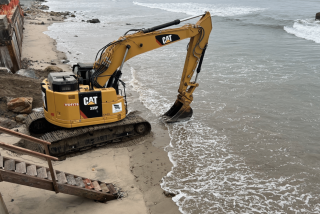A Malibu Civics Lesson: Beach Is Open
- Share via
Before Sara Wan could spread her towel on Malibu’s Broad Beach on Sunday, a goateed security guard swooped in on his all-terrain vehicle and warned her not to sit on the dry sand. “You’re on private property,” he said.
The 64-year-old Malibu resident and California Coastal commissioner sat down in the sand anyway and refused to budge. The encounter grew more testy until the security guard snarled that he was calling the Sheriff’s Department.
“You better look at the law girl -- I’m telling you,” the security guard said and then tore off down the beach in his four-wheel Honda ATV.
Altercations between beachgoers and security guards occur with regularity at Broad Beach, a small oceanfront community where nonresident sunbathers, picnickers and others are booted off the dry sand, which the community considers private property.
Most beachgoers slink away. This incident ended differently. Soon five sheriff’s deputies who had ridden ATVs up the coast from nearby Zuma Beach surrounded Wan. She took the opportunity to give an impromptu civics lesson, explaining that she was, in fact, sitting on public beach.
Wan produced the documents to show that, despite the no-trespassing signs, the homeowner had granted public access to a 25-foot strip of dry sand 22 years ago. The public easement was offered in exchange for the Coastal Commission’s permission for expansion of the home.
“What do I know -- I’m just a dumb deputy,” said Sheriff’s Deputy Gail Sumpter, the first one with a badge to confront Wan.
California’s public access law is confusing and lends itself to conflict. Unlike laws in Oregon, Texas and Hawaii, where beaches are public to the first line of vegetation, California law guarantees public access only seaward of the mean high tide line. As a practical matter, that means the public portion is on the damp sand -- a rule rigorously enforced on Broad Beach by security guards and sheriff’s deputies called as backup.
The situation on Broad Beach is a bit more complicated. Officials with the Coastal Commission and State Lands Commission note that 43 of the 108 houses along Broad Beach have public easements on the dry sand.
Most of these consist of a 25-foot-wide strip of sand just inland from the mean high tide. Others cover the entire stretch of dry sand up to houses’ decks or bulkheads.
It’s impossible to tell which houses have these easements, and which do not, without carrying a sheaf of maps and property records.
Therefore, many Broad Beach homeowners seem to ignore these long-standing promises, state officials say.
The beach is littered with no-trespassing signs to keep the public away from weekend getaway homes for wealthy business leaders and celebrities such as Steven Spielberg, Danny DeVito, Goldie Hawn, Dustin Hoffman and Barbara Sinatra.
Fourteen of these signs, according to state records, are on properties that have public easements across dry sand.
The homeowners assess themselves $3,000 to $5,000 apiece a year, depending on the size of the property, to maintain the community and to hire security guards to enforce their private property rights, said Marshall Grossman, an attorney with a weekend house at Broad Beach.
To be any less vigilant, he said, could mean that the public would obtain legal “prescriptive rights” to use the beach. “If we allowed people to sit where they wanted, it would quickly become public land,” he said.
Furthermore, he said, the guards provide for public safety, and clean up after visitors on the beach, which is easily accessible through two public walkways from Broad Beach Road and a longer stroll from Zuma Beach.
Grossman accused Wan of seeking a publicity stunt on Sunday by inviting the Los Angeles Times to watch her confrontation with a Broad Beach security guard -- an accusation that Wan denied.
“On every holiday weekend, we have hundreds of people on this beach without incident,” Grossman said. “They are welcome to come. They sit on the beach and nobody is disturbed.”
Yet the Coastal Commission has a thick file of complaints from beachgoers complaining of harassment from Broad Beach guards.
“Broad Beach is the only place we know on California’s 1,100- mile coastline where you have these conflicts, and a community hiring guards to kick out the public,” said Linda Locklin, the commission’s coastal access manager.
Lauriann Wright, 33, a Marina del Rey attorney, was one of those who lodged a complaint.
She said she and a girlfriend settled into a place on the dry sand on the beach embankment out of view of the oceanfront homes on July 5, when the security guards arrived and ordered them to move closer to the water.
“My girlfriend and I were wearing bikinis and their goal was to make us uncomfortable,” she said. “They kept staring at us saying, you’ve got to move. It was kind of lecherous.”
Wright and her friend moved closer to the water and soon the incoming tide swamped their towels, she said.
Steve Hoye, an activist who quit his job as a fund-raiser to push beach access laws in Malibu, called Broad Beach “the next battleground.” His group, Access for All, is engaged in a lawsuit with entertainment mogul David Geffen over a public walkway that Geffen has blocked with a gate.
“We would like to see Broad Beach disband its police force and the no-trespassing signs come down,” he said. “If they don’t, I would like to put up state signs that say, ‘State beach from here to here, public access encouraged.’ I’d like to have maps made up to show people where they are allowed to go and sit on the dry sand.”
More to Read
Sign up for Essential California
The most important California stories and recommendations in your inbox every morning.
You may occasionally receive promotional content from the Los Angeles Times.













